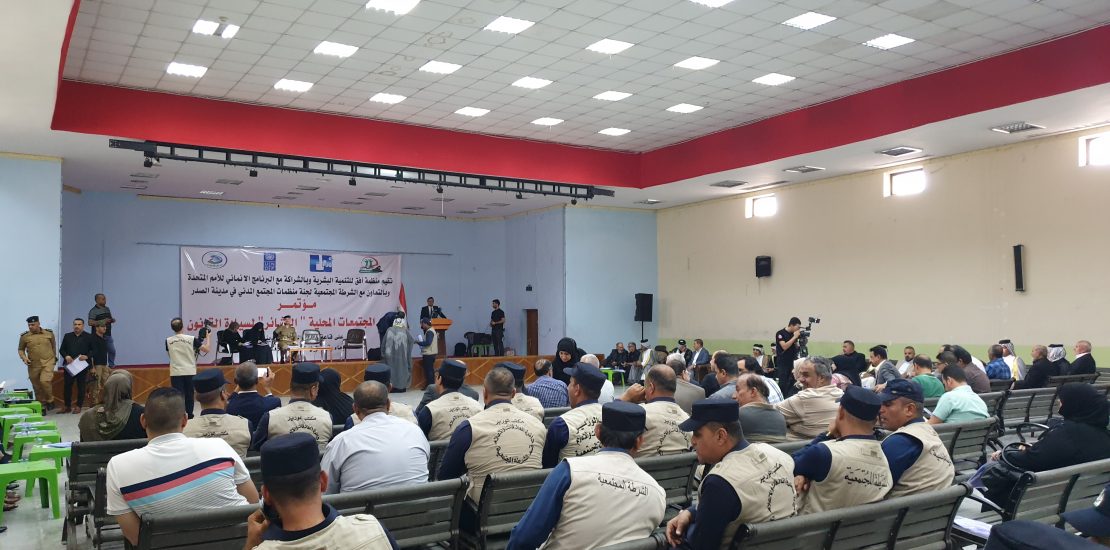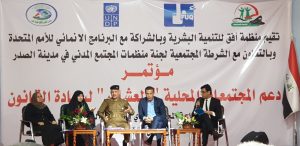- 2 أكتوبر، 2019

In cooperation with the United Nations Development Program (UNDP), our organization organized a conference entitled “The Role of Local Communities in Supporting the Rule of Law” in Sadr City.
The conference was attended by members of the Baghdad Provincial Council, municipal council members, members of the security establishment, community police, judges, lawyers, tribal elders, mukhtars, civil society organizations, human rights activists, and journalists.
The conference aims to strengthen partnerships between local (tribal) communities and local and community police to ensure safer communities across Sadr City.
The most important outputs of the conference:
• Agreement on the formation of a team to address social problems through community police and civil society organizations to contribute to communication and reduce clashes.
• The need to activate Article 45 II of the Iraqi Constitution on the organization of the work of the Iraqi tribes.
• Ensure that the law is applied to all without prejudice, favoritism or intimidation.
There have been extraordinary challenges to the success of this program, some of which relate to the nature of the stakeholders and most are related to the environment. :
- Timing factor where one of the challenges facing us is the race with time to avoid the timing of religious events very important for the target environment where the program coincided with three main occasions for the community of Sadr City (Eid al-Adha, the days of Ashura, Arbain Imam Hussein) This challenge has been taken into account And setting appropriate times do not affect the functioning of the program.
- Another challenge related to the unusual work environment for activists in particular, where it was not easy to arrange joint work between tribal elders, security forces and activists and bring them together in a collaborative and common work environment to reach a common ground that can be a starting point and a basis for building on it, due to social and political factors. We have overcome this by conducting prior visits and meetings for all parties, before starting activities and identifying mechanisms that suit the culture of society and stakeholders.
- One of the major challenges that have accompanied work on preparations for the conference, due to possibly unprecedented circumstances. As we were in the run-up to the conference, tensions began to grow in the work environment due to three main events:
The first is the removal of excessive construction on state buildings and properties using force.
Second, dispersing peaceful protests of graduates in a manner characterized by excessive violence.
The third was the dismissal of Lieutenant General Abdul Wahab al-Saadi.
At this stage, we set a date for the conference and we addressed the official bodies of the members of the Iraqi parliament and representatives of the federal and local government, and the date was October 1.
But on Friday, September 27, we had to change the date to October 2, to avoid the impact of demonstrations on attending the conference, fear of blocking roads, and the possibility that law enforcement officials would be unable to attend. What happened on Tuesday and the unfortunate events that accompanied the demonstrations of the use of excessive force by the authorities, in fact, affected the official attendance of the conference to some extent, especially members of the House of Representatives. The number of 8 (Alaa al-Rubaie, Shaima al-Tamimi, Anaam al-Khuzaie, Amjad al-Oqabi, Hassan Maya al-Halafi, Insijam al-Gharawi, Hassan Salem) where members of the legislative authority apologized in recent hours for several reasons, most notably for fear of clash with the demonstrators that Sadr City was the tensest areas in Baghdad During the demonstrations from 1 – 5 October. However, this was addressed by the presence of representatives of the deputies and members of the Baghdad Provincial Council and representatives of the Ministry of Interior and National Security.
- The biggest challenge was the sensitivity of the topic in conjunction with the existing demonstrations. Local community members complained about the loss of some of their family members due to the violence of the security authorities. The conference was reflected positively through the solidarity of members of the security establishment with the families and tribal leaders that security is the responsibility of all.


